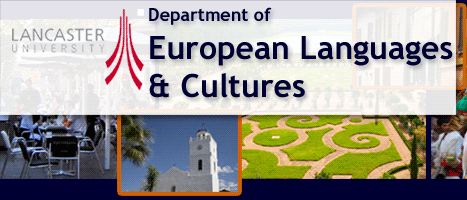
NEWS AND EVENTS ARCHIVE (2009-2014)
Archive
Solidarity in the 21st Century - Collaborative event with the universities of Manchester and Liverpool
Date: 30 May 2014 Time: 9.00am-6.00pm
Venue: Room A3.7 Ellen Wilkinson Building (near Contact Theatre), University of Manchester
Solidarity in the 21st Century
A collaboration between Lancaster University, the University of Manchester (CLACS), and the University of Liverpool
All welcome
Organizers: Cornelia Gräbner, Parvathi Kumaraswami, Marieke Riethof
The organisers thank the Society for Latin American Studies for their support.
Guest Speakers:
Alex Campos Garcia
The collective Olhares nomadas (Nomad Eyes) started in Lisbon in 2004. The photographic, videographic and pedagogic work of the collective explores and practices the 'gaze from below' as an astute attention to the everyday, and as a practice of seeing that recognizes, responds to, and actively nurtures resistances to capitalist oppression. 'The Gaze' becomes the occasion and the space for an encounter between members of the collective and communities they encounter on their travels (African communities in the periphery of Lisbon, M15, women in the Saharauí refugee camps in Algeria, inhabitants of favelas in Sao Paulo, children in Cambodian orphanages, the Zapatista communities, etc.).
Alex Campos is a founding member of the collective. He is a photographer, video artist, documentary maker and has taught at the program Formación Acompañada Intensiva in Lisbon. He currently lives in San Cristóbal in Mexico, where he works in and with Zapatista, indigenous, and urban communities.
Rafael Ramos, political and cultural activist from Venezuela
Rafael Ramos (BA Fine Arts and political activist) has long been a member of the left-wing political student movements in Venezuela. He founded and coordinated the Fente Estudiantil FCI at his university, UNEARTE. He is part of the political leaderhip of the Juventud PSUV in Caracas and has represented Venezuela at various academic conferences in the UK and elsewhere. He was part of the JPSUV delegation to the Social Forum in Sao Paulo in 2012, and is currently on the commission for international affairs of the JPSUV-Caracas. Rafael is visiting the UK and has given several talks about the situation in Venezuela.
Mark Burton and Bruce Rafeek (Manchester Cuba Solidarity Campaign)
Representative of the Cuban Embassy in London
Conference Programme:
9-9.45: Introductory Session and Forum: Epistemologies and Practices of Solidarity, co-ordinated by the organizers
9.45-10: Coffee Break
10-12: Exilic Solidarity, co-ordinated by Dr Marieke Riethof (University of Liverpool)
The panel examines transnational solidarity networks in opposition to the Pinochet regime and the role of Chilean exiles, who encountered local solidarity groups when they left the country from 1973 onwards. The Chile Solidarity movement offered practical support to exiles, organised boycotts, cultural and political events, and lobbied nationally and internationally to address human rights violations. An analysis of transnational solidarity in the Chilean case also allows for a critical examination of the traditional conceptualisations of Cold-War forms of international solidarity. The invited speakers focus on transnational solidarity with Chile during the Allende government and the Pinochet regime, and on ways in which the civilian government dealt with human rights violations after 1990.
12-1: Lunch
1-3: Statist Solidarity, co-ordinated by Dr Parvathi Kumaraswami (University of Manchester)
The panel explores how solidarity groups work from a position of commitment to support and further state projects for development, and how these groups work as gatekeepers who negotiate the desire for grassroots connections between communities on either side of the encounter. Key invited speakers include Rafael Ramos, a Venezuelan artist and political activist who will be temporarily based in Manchester at this time, a representative of the Cuban Embassy, and figures from the Manchester group of the Cuban Solidarity Campaign who will trace the ruptures and continuities in the relationship between solidarity groups in the UK and the Cuban and Venezuelan governments. Two more specific areas of focus will be a) the implications that the recent changes in economic policy under Raul Castro have for the solidarity movement and b) the role of solidarity movements in disseminating alternative visions of political and social change (such as that currently occurring in Venezuela) to those propagated in the mainstream global media.
3-3.15: Break
3.15-5.15: Autonomous Solidarity: Zapatismo in different Geographies and Calendars, co-ordinated by Cornelia Gräbner (Lancaster University) and Alex Campos (Nomad Eyes)
The session on Zapatista solidarity focuses on the practical and epistemological implications of the concepts of 'encounter' and 'difference', crucial to Zapatista solidarity. Zapatista solidarity is defined as a shared commitment to building 'the world where many worlds fit' in our geographies and calendars, and according to our 'modos'. In the workshop Campos and Gräbner draw on themes which were highlighted in a series of EZLN communiqués and in the context of the 'little school': the gaze from below, the importance of critique and ethics for the building of global alternatives, the connection between global and transcultural resistances located in different geographies, and the alternative to imposed and prescribed perspectives and identities embodied in the (only seemingly paradoxical) figure of cat-dog.
5.30-6 Closing Forum, co-ordinated by the organizers
Dr Par Kumaraswami, Co-Director,
Centre for Latin American and Caribbean Studies (CLACS),
School of Arts, Languages and Cultures,
Samuel Alexander Building,
University of Manchester,
Manchester M13 9PL, UK.
tel: (44) 161-275-3046
Monograph published November 2012: Literary Culture in Cuba: Revolution, Nation-building and the Book, MUP
Postal address: Ellen Wilkinson Building, Devas Street, Manchester M13 9PT.
Access possibilities and regulations:
Entrances: Main entrance on Devas Street for students and staff.Rear entrance opposite the Northern Examination and Assessment Boards (NEAB).
Disabled access: a ramp for wheel chair access is provided.
Building No 77 on the Campus Map: http://documents.manchester.ac.uk/display.aspx?DocID=6507
Contact:
Who can attend: Anyone
Further information
Associated staff: Cornelia Graebner
Organising departments and research centres: European Languages and Cultures, Latin America Research Cluster
Keyword: